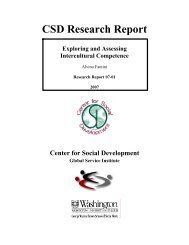Rediscovering social investment in developmental welfare state ...
Rediscovering social investment in developmental welfare state ...
Rediscovering social investment in developmental welfare state ...
Create successful ePaper yourself
Turn your PDF publications into a flip-book with our unique Google optimized e-Paper software.
R E D I S C O V E R I N G S O C I A L I N V E S T M E N T I N D E V E L O P M E N T A L W E L F A R E S T A T E P O L I C I E S :<br />
B A C K T O T H E F U T U R E<br />
differentiates it from three <strong>in</strong>stitutionalized approaches for promot<strong>in</strong>g <strong>social</strong> <strong>welfare</strong>: <strong>social</strong><br />
philanthropy, <strong>social</strong> work, and <strong>social</strong> adm<strong>in</strong>istration (i.e., <strong>social</strong> service or <strong>social</strong> policy, which is<br />
<strong>in</strong>extricably l<strong>in</strong>ked to the contemporary <strong>welfare</strong> <strong>state</strong>).<br />
In Midgley‘s (1995, p. 16) words, the key difference between the <strong>social</strong> development approach,<br />
which he suggests has not been widely adopted, and the other approaches, which have been widely<br />
adopted, is the attempt to ―l<strong>in</strong>k <strong>social</strong> policies and programmes directly to a comprehensive process<br />
of economic development.‖ However, <strong>social</strong> development, which traces its roots to a fragmented<br />
literature, rema<strong>in</strong>s theoretically underdeveloped and largely undef<strong>in</strong>ed <strong>in</strong> programmatic terms<br />
(Midgley, 1995, 2003a, 2006). Despite relatively widespread agreement on the <strong>in</strong>terdependence of<br />
<strong>social</strong> and economic development efforts, <strong>social</strong> development is a viewpo<strong>in</strong>t that arises from a<br />
variety of disparate perspectives that have not yet coalesced <strong>in</strong>to a uniform outlook.<br />
In light of these concerns, this section focuses on clarify<strong>in</strong>g what is meant by <strong>social</strong> development<br />
and seeks to forge a more cohesive and critical vision of <strong>welfare</strong> <strong>developmental</strong>ism and productive<br />
<strong>social</strong> policy. I follow the <strong>social</strong> <strong>developmental</strong>ists <strong>in</strong> ―challeng<strong>in</strong>g the neoliberal claim that <strong>social</strong><br />
expenditures harm the economy‖ (Midgley & Tang, 2001, p. 244). However, I use <strong>social</strong><br />
development not to formulate new approaches to harmoniz<strong>in</strong>g <strong>social</strong> and economic development,<br />
which has historically been its central focus, but rather to understand how exist<strong>in</strong>g <strong>social</strong> policies <strong>in</strong><br />
developed <strong>welfare</strong> <strong>state</strong>s may already do so. This approach marks a stark departure from the way <strong>in</strong><br />
which <strong>social</strong> development has been used to date.<br />
Social development scholars have noted the importance of systematically develop<strong>in</strong>g propositions<br />
about the conditions under which <strong><strong>in</strong>vestment</strong>s <strong>in</strong> human development have important returns<br />
(Beverly & Sherraden, 1997). Along these l<strong>in</strong>es, other scholars have called for a comprehensive<br />
formulation of what critical <strong>social</strong> development practice <strong>in</strong>volves <strong>in</strong> terms of <strong>social</strong> policy<br />
<strong>in</strong>tervention (Midgley, 2001). I develop a critical perspective on <strong>social</strong> development that is somewhat<br />
dist<strong>in</strong>ct from <strong>social</strong> development theorists. I reconsider the relation between development studies<br />
and <strong>welfare</strong> <strong>state</strong> studies, synthesiz<strong>in</strong>g ideas from both and elaborat<strong>in</strong>g on what has been termed the<br />
<strong>in</strong>clusive strand of <strong>welfare</strong> <strong>developmental</strong>ism (UNDESA, 1971, Kwon, 2007). I redef<strong>in</strong>e this<br />
perspective with<strong>in</strong> the context of developed <strong>welfare</strong> <strong>state</strong>s as the attempt to understand exist<strong>in</strong>g <strong>social</strong><br />
policy <strong>in</strong>terventions, the effects of which appear to be at odds with neoliberal explanations.<br />
Comb<strong>in</strong><strong>in</strong>g <strong>developmental</strong>ist ideas with policy-oriented <strong>in</strong>sights from <strong>welfare</strong> <strong>state</strong> research yields a<br />
coherent explanatory framework for understand<strong>in</strong>g the productive (reproductive) effects of <strong>social</strong><br />
policy <strong>in</strong> <strong>in</strong>dustrial countries. 21<br />
<strong>social</strong> change‖ (Midgley, 2006, p. 1236). Social development ideas <strong>in</strong>fluenced both the expansion of government <strong>social</strong><br />
provisions (and evolution of Western <strong>welfare</strong> statism follow<strong>in</strong>g World War II) and the emergence of <strong>social</strong> development <strong>in</strong><br />
the Global South.<br />
21 The critical perspective <strong>in</strong> <strong>social</strong> development perta<strong>in</strong>s to a vision of what an alternative, just society would consist of and<br />
implies a criticism of exist<strong>in</strong>g arrangements (Midgley, 2001, p. 47). However, it does not speak <strong>in</strong> programmatic terms to<br />
societies <strong>in</strong> which poverty and <strong>in</strong>equality is not (or rather is no longer) so pervasive, and therefore to the types of policies<br />
that may serve to prevent poverty. The sense <strong>in</strong> which the term critical was applied <strong>in</strong> my orig<strong>in</strong>al dissertation on which<br />
this paper is based perta<strong>in</strong>s to refram<strong>in</strong>g the normative challenge that <strong>social</strong> development implicitly poses to ma<strong>in</strong>stream<br />
economics as an explicit effort to develop alternative hypotheses to those of the ma<strong>in</strong>stream and exam<strong>in</strong>e the productive<br />
potential of redistribution. The same economic orthodoxy that has led to distorted development <strong>in</strong> the Global South<br />
may eventually lead to retrenchment <strong>in</strong> the Global North if the connections between production and distribution are not<br />
better understood (Myrdal, 1974). An important part of this project <strong>in</strong>volves revisit<strong>in</strong>g, recover<strong>in</strong>g, and re<strong>in</strong>fus<strong>in</strong>g<br />
contemporary development th<strong>in</strong>k<strong>in</strong>g with old political economic <strong>in</strong>sights. Argu<strong>in</strong>g for new <strong>social</strong> policies that may be able<br />
C E N T E R F O R S O C I A L D E V E L O P M E N T<br />
W A S H I N G T O N U N I V E R S I T Y I N S T . L O U I S<br />
15
















